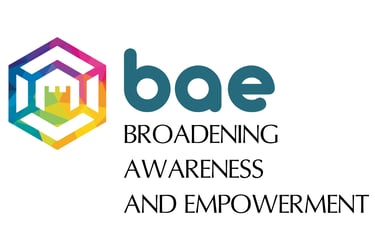BAE Counselling & Therapy centre | KOTA damansara
The Journey of Being in Therapy: What I’ve Learned About Hope, Myths, and Growth in Therapy
Sharing of experience being in therapy as a client and as a psychotherapist/counsellor working with individuals in need of emotional support and resolution.
ABOUT THERAPY
Alix Chan
8/21/20256 min read



What Is Therapy?
Let me start by saying therapy has been one of the most meaningful journeys in my life, both as someone who helps others and as someone who has learned so much through therapy. Yes, I do go for therapy too. If you’re wondering what therapy really is, think of it as a safe space where you can talk about anything that’s on your heart. Usually those heavy topics that you won't be telling your friends because you don't feel safe letting them into this area of your inner world.
Safe space means your sharings are private and confidential, and also no judgements made about the things you shared with the therapist. A therapist is someone who listens, explores and guides you through your thoughts and feelings like helping you to untangle a messy yarn hank and rewind into a yarn ball. In the midst of untangling these tangles, the therapist will also help you to resolve the causes of the entanglement and recognise unhelpful patterns of coping so that we become aware of our unconscious coping mechanism.
A brief sharing of my own experience: At the time when I sought therapy, I was overwhelmed with life's tasks which comes with being a daughter, a mother, a therapist. Ironically I was the care giver who made sure everyone is taken care of while unconsciously neglecting myself which leads to a burnout, trouble sleeping and low mood. During therapy, my therapist explored the archetype of a caregiver with me and also the shadow side. It hits me that I was rebelling my roles by unconsciously not taking care of myself. Also, the impact of the scripts which I grew up with in my house hold that "I need to do more" to be praised. Having these awareness were like a reminder every time I commit to tasks.
When I work with people in therapy, I notice that every story is different, but everyone wants to feel understood and supported. Therapy isn’t just for when you’re sad or confused—it’s also a place to celebrate your wins, explore your questions, and grow as a person. I have clients who would like to arrange their thoughts and feelings periodically to keep their thoughts and feelings in check. And I do have clients who are going through tough periods in their lives and have tried many ways that they know of to help themselves and yet not reaching the desired results hence they reach out to therapy.
What Is the Difference Between Therapy and Counselling?
I get asked this a lot, and I can tell you from my experience, therapy and counselling have their similarities, but also a few differences. Counselling is usually for specific problems or tough moments, like trouble with school, work, or friends. It’s often short-term and helps you find solutions for what’s bothering you right now. Usually most clients started off with counselling because they have a particular issue that they can't resolve repeatedly. If issues are resolved and there aren't any residual feelings like lingering dissatisfaction of a particular agenda or something heavy tugging at the back of your mind then it's a wrap of your counselling journey. You're good to explore your life with a renewed lens. Yay!
Therapy, on the other hand, can go deeper. It’s about understanding yourself better, looking into your feelings, and most times exploring your past. Therapy can last longer, why? Just think of the amount of accumulated experiences we have gather throughout our living years and the numerous coping mechanism we have strategised and failed (we are only taking the failed ones into account because these are the ones that impacted us negatively). The older we are, the more layers we have armoured ourselves with and the more time will be spent peeling these layers and processing them one at a time. So, therapy is great for anyone who wants bigger changes, or needs help with feelings that last a long time, like sadness or worry. I always remind people that both are valuable—it’s about finding what fits you best.
When or How Does Someone Decide to Seek Therapy?
I remember when I first thought about reaching out for support, I wondered if my problems were “big enough.” It’s a common feeling. But here’s what I’ve learned: anyone can go to therapy. It doesn’t matter how big or small your worries are. In therapy, people just want to feel better. Some signs you might want support include:
· Feeling sad, worried, or angry a lot of the time
· Not enjoying things you once liked
· Trouble sleeping, eating, or focusing
· Feeling lonely, even with others like you don't belong
· Finding it hard to talk to family or friends about your feelings
· Wanting to understand yourself better and grow
Deciding to seek therapy is a brave and positive choice. Even if you feel unsure, it’s okay—most people feel nervous before asking for help. Caring for your own well-being is always worth it.
What Happens in a Therapy Session?
If you’ve never tried therapy before, it can feel mysterious. As a counsellor/therapist I can tell you that you’ll be greeted with comfy chairs and a warm smile. A session is usually in a comfy room or even online, where you sit with your therapist and talk about what’s on your mind. There’s no right or wrong thing to say. Your therapist listens without judging you. Sometimes they’ll ask questions to help you think more deeply; other times, they suggest ways to manage stress or practice new skills together. Therapy in Malaysia comes in different styles, so you can choose what works for you. You may want to ask your therapist what modality do they use in therapy and read up about it online. You’re always in control of what you share, and you set the pace.
Debunking Myths about Therapy
There are still some myths about therapy, especially here in Malaysia. Let me clear up a few that I hear most often:
Myth 1: Therapy Is Only for Weak People
This couldn’t be further from the truth! It takes a lot of courage and strength to face your feelings and ask for help. Admitting that we have a problem is already a win on itself! How often do we see people being vulnerable and honest? In my practice, I see strong, kind people every day who choose therapy to care for themselves and people close to them (the ones impacted most are the ones closest to us).
Myth 2: Therapy Is for Crazy People
This is another myth that needs to go! The stigma of mental health is still prevalent in our society. Therapy is for anyone who wants to feel better or understand themselves. Most people I see are just regular folks—students, parents, professionals, even kids—who want to learn to reconnect with themselves and grow to become their better selves. Therapy is for everyone, not just those with big or dramatic problems.
Myth 3: People Who Go to Therapy Are Just Seeking Attention
I hear this sometimes, and I want to say, wanting to feel better is not about seeking attention at all. It’s about caring for yourself and your mind. What happens in therapy is private, and everything you share is kept confidential. There won't be a broadcast. More and more people in Malaysia are learning that reaching out for help is a healthy, positive step.
The Benefits of Therapy
Therapy has so many benefits, and I’ve seen it first-hand. It gives you a safe space to talk, helps you untangle confusing feelings, seeks clarity about your situation, and if you are open to learn some therapeutic skills it teaches you skills to handle life’s ups and downs. I’ve watched people solve problems, build self-confidence, and become happier. In therapy, people discover new ways to make choices, grow relationships, and enjoy life more. Even during hard times, therapy can offer hope and a fresh way to move forward.
The Flipped Sides of Therapy
Going though the process of therapy can be very intense depending on the depth of our issues. Therapy can unraveled deep hidden experiences and emotions which were suppressed. It is not a joyride all the way to wonderland. At times there are reliefs and at times there are sorrow and anger (not limited to these and can be different). So come prepared to do your own self-work. Your therapist will guide you and support you through out your journey.
How to Find a Therapist in Malaysia
If you feel therapy might help you or someone you care about, there are lots of ways to begin in Malaysia. You can search online, ask your doctor, or connect with mental health organisations near you. Don’t be shy to ask questions before choosing a therapist: What kind of therapy do they offer? How long are the sessions? How much do they cost? In Malaysia, there are therapists who speak many languages and understand different cultures, so you can find someone who makes you feel comfortable.
Encouragement for Your Journey
Starting therapy is a big step, and it’s normal to feel nervous or unsure. Remember, therapy is a journey, not a race. You set your own pace and decide what matters most to you. Every small step you take is a victory for your mental health. If you’re thinking about therapy in Malaysia, know you’re not alone. Many people have walked this path and found hope, healing, and happiness.
A Path to Courage and Growth
Therapy isn’t just for certain people—it’s for anyone who wants to feel better, learn, and build a happier life. Whether you’re facing a big challenge or just need someone to talk to, therapy is here for you. Asking for help is a sign of strength. You deserve support, understanding, and a safe space to be yourself. Let’s keep breaking myths and encourage everyone to care for their minds and hearts. Together, we can make the journey of therapy positive, hopeful, and open to all.


